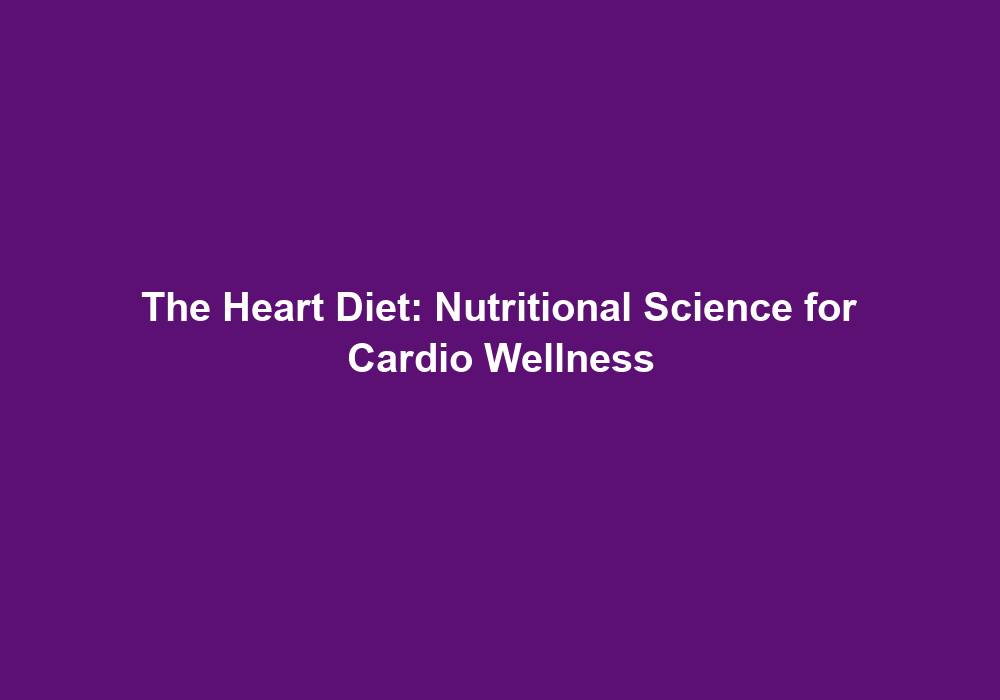The Heart Diet: Nutritional Science for Cardio Wellness
The importance of maintaining a healthy heart cannot be overstated. One of the key factors in promoting cardiovascular wellness is following a well-balanced and nutritious diet. By incorporating specific foods into your daily meals, you can support your heart health and reduce the risk of heart disease. In this article, we will explore the science behind the heart diet, highlighting the essential nutrients and foods that contribute to a healthy heart.
Understanding Cardiovascular Wellness
Cardiovascular wellness refers to the overall health of your heart and blood vessels. It plays a significant role in preventing conditions such as heart disease, stroke, and high blood pressure. By adopting a heart-healthy diet, you can lower cholesterol levels, reduce inflammation, promote healthy blood flow, and maintain optimal heart function.
When it comes to cardiovascular wellness, it’s important to focus on maintaining a balanced diet that includes a variety of nutrients. By incorporating specific nutrients into your diet, you can provide your heart with the support it needs to function optimally. Some key nutrients for heart health include:
-
Omega-3 Fatty Acids: These essential fats are known for their heart-protective properties. They help reduce inflammation, lower triglyceride levels, and prevent the formation of blood clots. Consuming sources of omega-3 fatty acids such as fatty fish (salmon, mackerel, sardines), walnuts, flaxseeds, and chia seeds is highly beneficial for cardiovascular wellness.
-
Fiber: A diet rich in fiber helps regulate cholesterol levels by lowering LDL (bad) cholesterol and increasing HDL (good) cholesterol. It also aids in maintaining a healthy weight and preventing diabetes, which are both risk factors for heart disease. Whole grains, fruits, vegetables, legumes, and nuts are excellent sources of dietary fiber.
-
Antioxidants: Antioxidants protect against oxidative stress, which can damage blood vessels and contribute to heart disease. Foods rich in antioxidants, such as berries, citrus fruits, dark chocolate, and green leafy vegetables, should be incorporated into your heart-healthy diet.
-
Potassium: This mineral plays a crucial role in maintaining healthy blood pressure levels. Consuming potassium-rich foods like bananas, oranges, potatoes, spinach, and avocados can help regulate blood pressure and reduce the risk of heart disease.
-
Magnesium: Magnesium is involved in over 300 biochemical reactions in the body, including maintaining a regular heart rhythm and supporting blood pressure regulation. Incorporate magnesium-rich foods like almonds, spinach, black beans, and whole grains into your diet to promote heart health.
By incorporating these key nutrients into your diet, you can provide your heart with the necessary support for optimal function and reduce the risk of heart disease.
Foods to Include in the Heart Diet
Now that we understand the importance of specific nutrients for heart health, let’s explore the foods that are beneficial for maintaining cardiovascular wellness. By including these heart-healthy foods in your diet, you can further support your heart health.
-
Fatty Fish: Salmon, mackerel, and sardines are excellent sources of omega-3 fatty acids. These fatty acids have been shown to reduce inflammation, lower triglyceride levels, and promote healthy blood flow. Aim to include fatty fish in your diet at least twice a week to reap the heart-protective benefits.
-
Leafy Green Vegetables: Spinach, kale, and broccoli are packed with essential nutrients, including fiber, antioxidants, magnesium, and potassium. These nutrients contribute to a healthy heart by reducing inflammation, regulating blood pressure, and protecting against oxidative stress. Add these green vegetables to salads, stir-fries, and smoothies to support your heart health.
-
Berries: Blueberries, strawberries, and raspberries are not only delicious but also rich in antioxidants. Antioxidants help protect against oxidative stress and inflammation, which are both contributors to heart disease. Add berries to your breakfast cereal, yogurt, or enjoy them as a refreshing snack to provide your heart with a boost of antioxidants.
-
Whole Grains: Opt for whole grains like oats, quinoa, brown rice, and whole wheat bread over refined grains. Whole grains provide fiber, vitamins, minerals, and antioxidants that contribute to a healthy heart. They also help regulate cholesterol levels and promote healthy blood flow. Incorporate whole grains into your meals to support your heart health.
-
Legumes: Beans, lentils, and chickpeas are excellent plant-based sources of fiber, protein, and vitamins. Incorporating legumes into your diet helps lower cholesterol levels, maintain a healthy weight, and reduce the risk of heart disease. These heart-healthy foods can be added to soups, salads, and stews for a nutritious boost.
-
Nuts and Seeds: Almonds, walnuts, flaxseeds, and chia seeds are all heart-friendly options. They are rich in omega-3 fatty acids, fiber, and antioxidants. Snack on a handful of nuts or sprinkle seeds over salads and smoothies for added heart benefits. These foods also provide a satisfying crunch and add flavor to your meals.
-
Dark Chocolate: Indulging in moderate amounts of dark chocolate (70% cocoa or higher) can be beneficial for your heart. Dark chocolate contains flavonoids that improve blood flow and lower blood pressure. Enjoy a small piece of dark chocolate as a treat to support your heart health.
By incorporating these heart-healthy foods into your diet, you can provide your body with the nutrients it needs to maintain cardiovascular wellness.
Tips for Implementing the Heart Diet
Now that we have explored the science behind the heart diet and the foods that support heart health, let’s discuss some practical tips for implementing this diet into your daily life:
-
Meal Planning: Plan your meals in advance to ensure a well-balanced diet that incorporates heart-healthy foods. Include a variety of fruits, vegetables, whole grains, lean proteins, and healthy fats in your daily meals. This will help you stay on track and make healthier choices.
-
Reduce Sodium Intake: Excessive sodium consumption can lead to high blood pressure. Limit your intake of processed and packaged foods, as they are often high in sodium. Instead, season your meals with herbs, spices, and citrus juices for flavor. This will help reduce your sodium intake and promote heart health.
-
Cook at Home: Preparing your meals at home allows you to have better control over the ingredients and cooking methods. Limit the use of unhealthy fats, such as trans fats and saturated fats, and opt for healthier cooking oils like olive oil. This will help you reduce your intake of unhealthy fats and promote heart health.
-
Stay Hydrated: Drinking an adequate amount of water throughout the day helps maintain optimal heart function. Avoid sugary beverages and opt for water, herbal teas, or infused water for hydration. Staying hydrated is essential for overall health, including heart health.
-
Moderate Alcohol Consumption: If you choose to consume alcohol, do so in moderation. Excessive alcohol intake can increase blood pressure and contribute to heart disease. Men should limit their intake to two drinks per day, while women should limit it to one drink per day. Consuming alcohol in moderation is key to maintaining a healthy heart.
By implementing these tips, you can effectively incorporate the heart diet into your lifestyle and prioritize your heart health.
Conclusion
Adopting a heart-healthy diet is essential for promoting cardiovascular wellness and reducing the risk of heart disease. By incorporating omega-3 fatty acids, fiber, antioxidants, potassium, and magnesium through specific food choices, you can support your heart health. Remember to include fatty fish, leafy green vegetables, berries, whole grains, legumes, nuts, seeds, and dark chocolate in your diet. Plan your meals in advance, reduce sodium intake, cook at home, stay hydrated, and consume alcohol in moderation to further enhance the benefits of the heart diet. Prioritize your heart health today and enjoy a healthier and happier life ahead.







